Santini Guard Neos rain jacket review
Boasting high waterproofness and breathability without the use of PFAS, can the Santini Guard Neos really deliver the ultimate rainwear performance while meeting eco ideals?
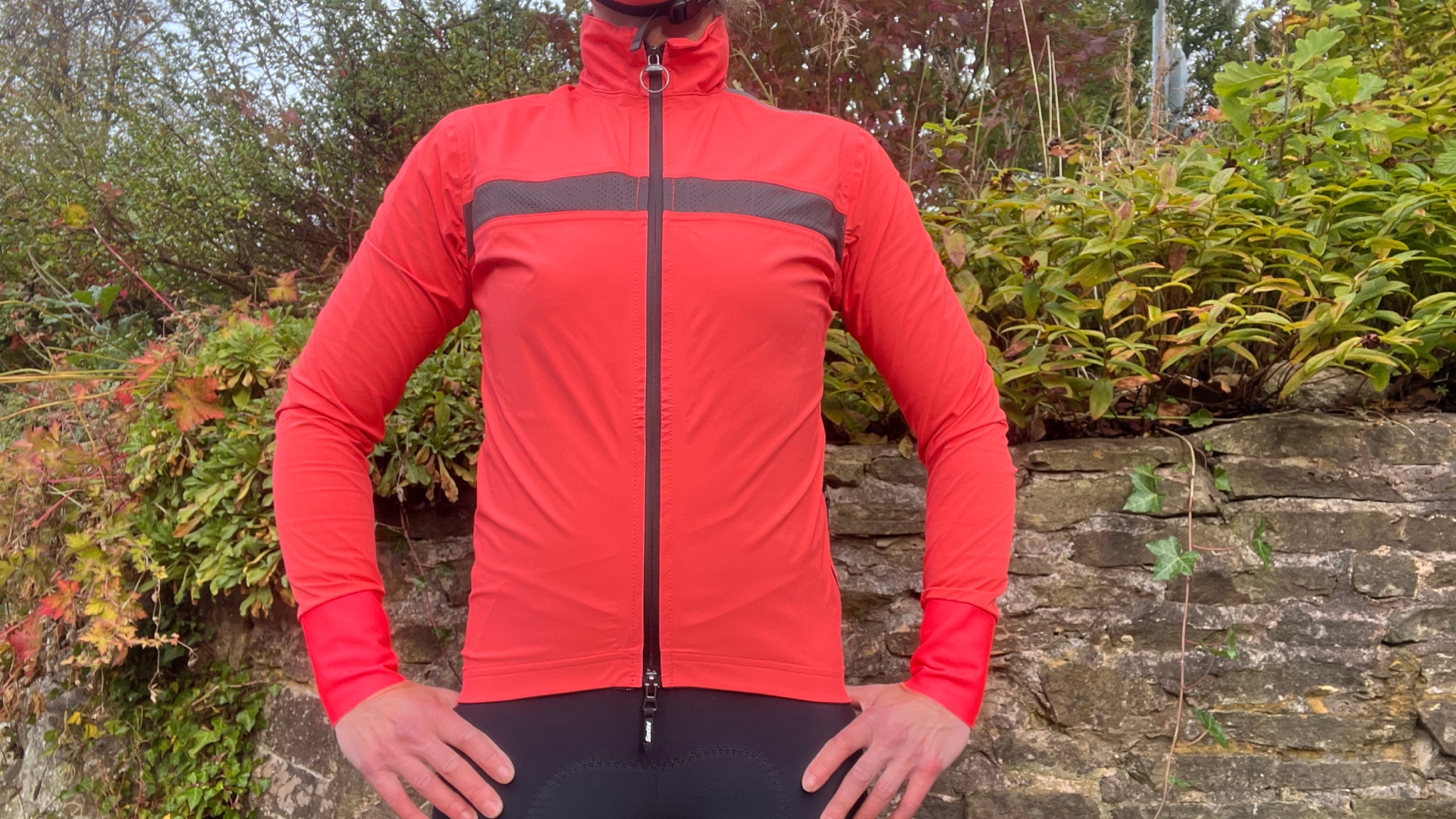
The Santini Guard Neos rain jacket will be a brilliant addition to any cycling wardrobe since it keeps the elements at bay while providing excellent breathability. The performance fit and capabilities come at a cost - the price tag makes this a considered purchase.
-
+
High water resistance
-
+
Great breathability even on warm days
-
+
PFAS-free fabric
-
+
Reflective detailing
-
+
Low cut back protection
-
+
Taped seams and waterproof zip
-
-
Only one small side pocket
-
-
Questionable helmet hood addition
-
-
Price
You can trust Cycling Weekly.
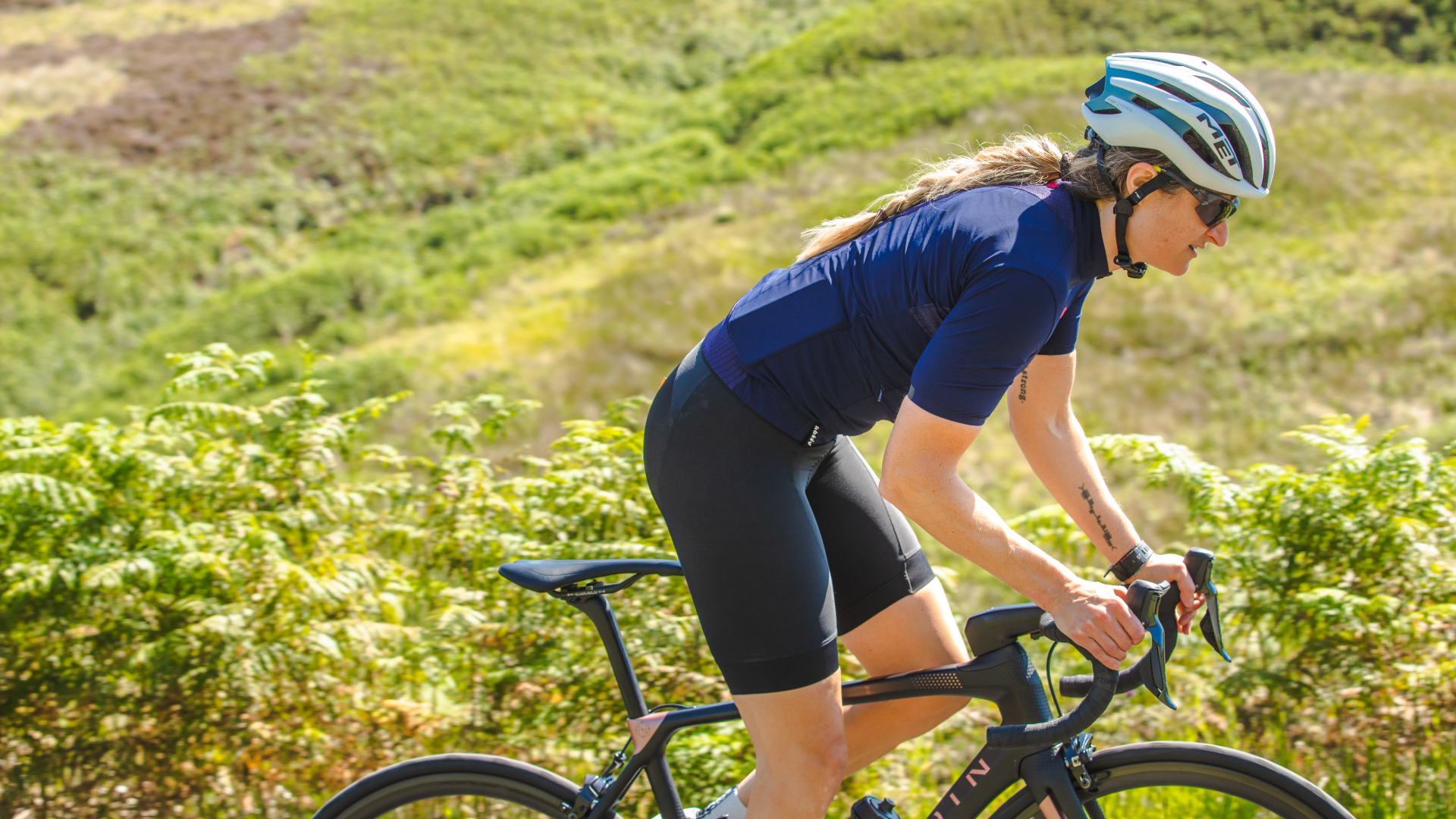
Producing one of the best waterproof cycling jackets is not for the faint-hearted. Not only are there the demands of riders, who require ample breathability and water resistance, but legislation, banning PFAS fabrics in the USA and Europe, has challenged the way that manufacturers can achieve these qualities.
With the Guard Neos, Santini says it's created a credible, new gen, PFAS-free waterproof and breathable rain jacket using a plant-based alternative for additional eco kudos.
Construction
While many rain jacket brands searched for alternatives to the original Gore-tex fabrics that fell foul of the new legislation, Santini continued to build on its long-term relationship with Polartec.
Santini says that partnering with a smaller fabric house has allowed it to become more closely involved in the development of suitable alternatives to PFAS chemical-based fabrics. The end is a lightweight Polartec Neoshell.
Polartec says that Neoshell is made from a membrane of millions of nanofibers, which provides 20,000mm of water column resistance (double the industry standard) but also 99 percent wind protection. The NeoShell fabric has also been designed to allow for dynamic air exchange and a full range of motion, essential for cyclists.
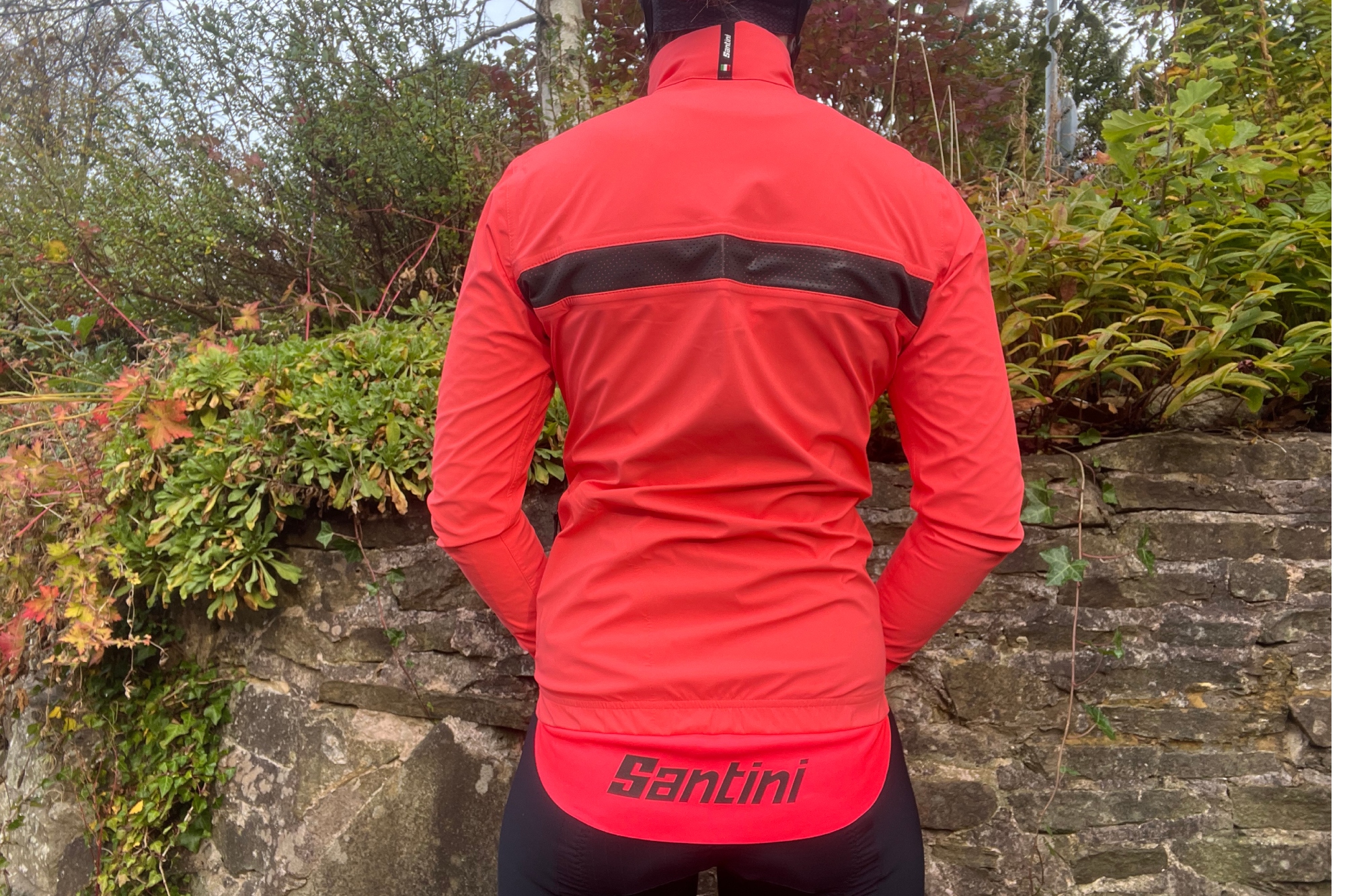
Rear of the Santini Guard Neos rain jacket
Other features of the Guard Neos nod to its waterproof capabilities: the waterproof zips, the polyurethane-coated raw cut cuffs - which are stretchy to allow for easy removal on the bike - and a polyurethane-coated thermal rear panel that ensures your lower back is protected from rear wheel spray.
Should you find yourself in a torrential downpour, Santini has even hidden a helmet hood in the collar.
Elsewhere are fully taped seams and a single waterproof zip-secure rear pocket.
The ride
Autumn in the north of the UK has taken up the weather where summer left it - it is very damp and mild, a perfect testing ground for a rain jacket, but a little warm to test its deep winter credentials.
However, provided I layered up correctly, I was immediately struck with just how versatile this rain jacket is in varying temperatures of between 7°C / 44.6°F up to 15°C/59°.
Layering decisions are made easier due to the Guard Neos' close resemblance to a softshell jacket, with a soft, warm-to-the-touch inside layer that's comfortable enough against just a long-sleeved base layer on warmer days. The fit is slim, and the jacket isn't super stretchy, so I personally found it a little tight on my arms.
Something that I can't abhor with traditional rain jackets is the cold plasticky feel of some fabrics, especially in the wet, even when the inside is still dry. For me, that's an issue that the Castelli Idro 3 W Shakedry rain jacket suffered from. The Guard Neos showed no signs of this.
Living in the hills of South Manchester, my riding terrain undulates with long climbs and descents following each other in quick succession. This puts any rainwear to work immediately, requiring both breathability and windproofing to be top-notch, and the Guard Neos didn't disappoint.
I've been quickly sold on the jacket's excellent air exchange requirements on my regular rides. Even on cold and damp days, with no real rain, I've popped on the Guard Neos teamed with a thermal gilet on top.
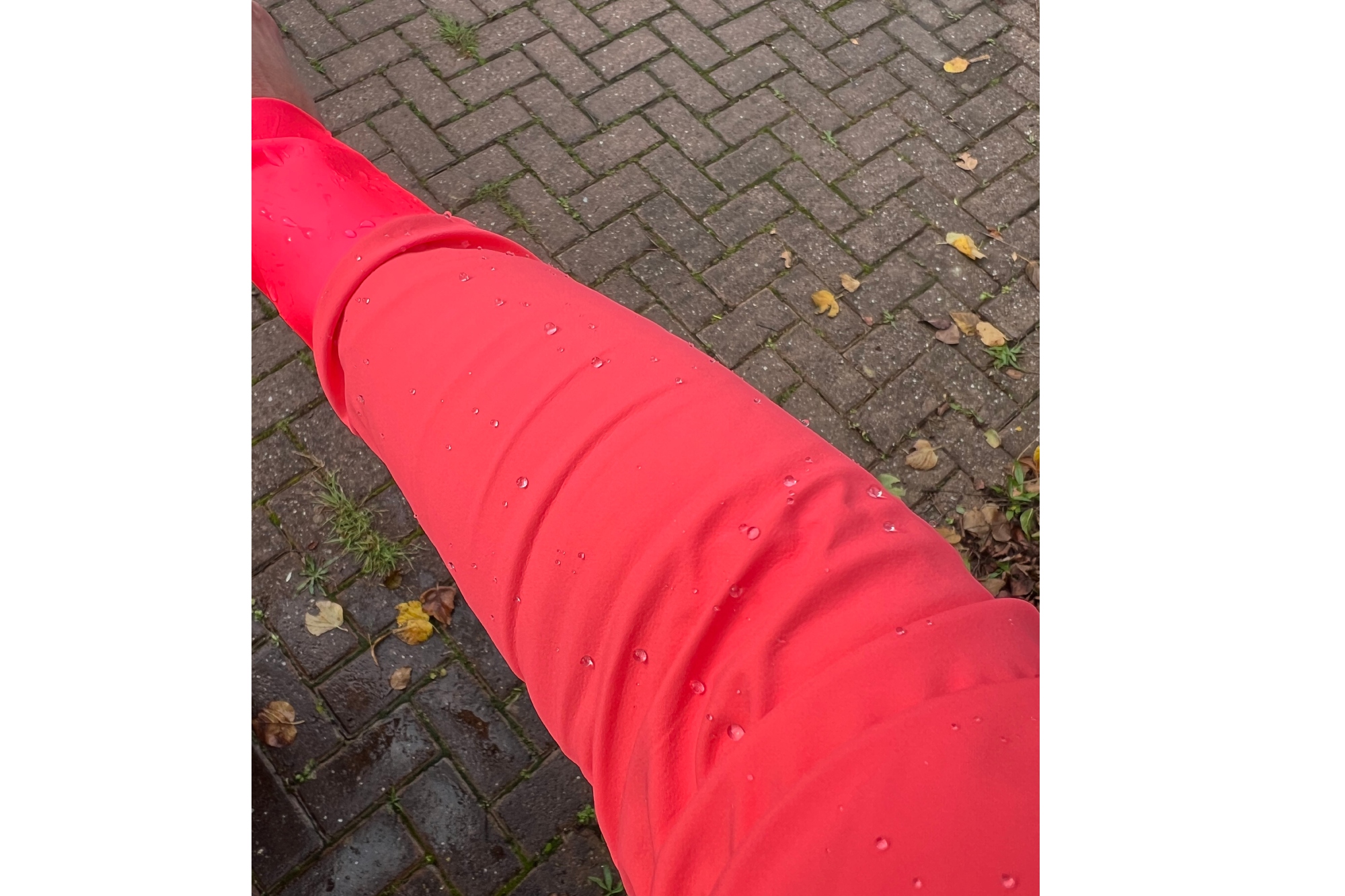
Water beading on the Santini Guard Neos rain jacket
The Guard Neos has shown itself to be a great barrier to water ingress. I have to admit to not having been out in torrential rain just yet, but in terms of drizzle and passing showers, the jacket has left me dry inside.
Santini rates this jacket at around the 20,000mm water column mark, and from my experience, it's proving a great water barrier. I'm interested in discovering the Guard Neos' performance on a foul wet day in the saddle. I'll update the review when the time comes.
Value and conclusion
The Santini Guard Neos is a brilliant jacket that proves useful in a range of conditions, not just the wettest days. The team behind the design has seemingly gathered all the best bits from other rain and softshell jackets on the market and scooped them into one garment.
In terms of criticisms, whilst the minimal rear pocket does make sense from a rain jacket perspective, I missed having the opportunity to simply grab a snack or carry spares.
What I wouldn't miss is the rain hood. I appreciate that this is highly practical, as it fits over your helmet and will prevent rain from dripping down your neck, but it's such a stark contrast to the performance feel of the rest of the jacket. I don't think I could ever see myself, or others for that matter, using it.
The elephant in the room is the price tag: £295/$305 (£320/$270 for the male version). I understand that this RRP is still just below the new Rapha Gore-Tex rain jacket, but these prices are becoming alarmingly high, and can't go unmentioned in a review.
It's a great jacket, which will no doubt be a great cycling wardrobe staple, you just have to really want to ride in the rain to justify the outlay.
Specification
- Fabric: Polartec Neoshell, thermosealed, thermowelded 20.000 mm water column
- Temperatures: 0°C to +10°C/32 to 50 °F
- Sizes: XXS - XXL
- Colours: Black, Pink
- Weight: 271g (size small)
- Gender: Female, Male

Thank you for reading 20 articles this month* Join now for unlimited access
Enjoy your first month for just £1 / $1 / €1
*Read 5 free articles per month without a subscription

Join now for unlimited access
Try first month for just £1 / $1 / €1
Get The Leadout Newsletter
The latest race content, interviews, features, reviews and expert buying guides, direct to your inbox!
Hannah is Cycling Weekly’s longest-serving tech writer, having started with the magazine back in 2011. She has covered all things technical for both print and digital over multiple seasons representing CW at spring Classics, and Grand Tours and all races in between.
Hannah was a successful road and track racer herself, competing in UCI races all over Europe as well as in China, Pakistan and New Zealand.
For fun, she's ridden LEJOG unaided, a lap of Majorca in a day, won a 24-hour mountain bike race and tackled famous mountain passes in the French Alps, Pyrenees, Dolomites and Himalayas.
She lives just outside the Peak District National Park near Manchester UK with her partner, daughter and a small but beautifully formed bike collection.
-
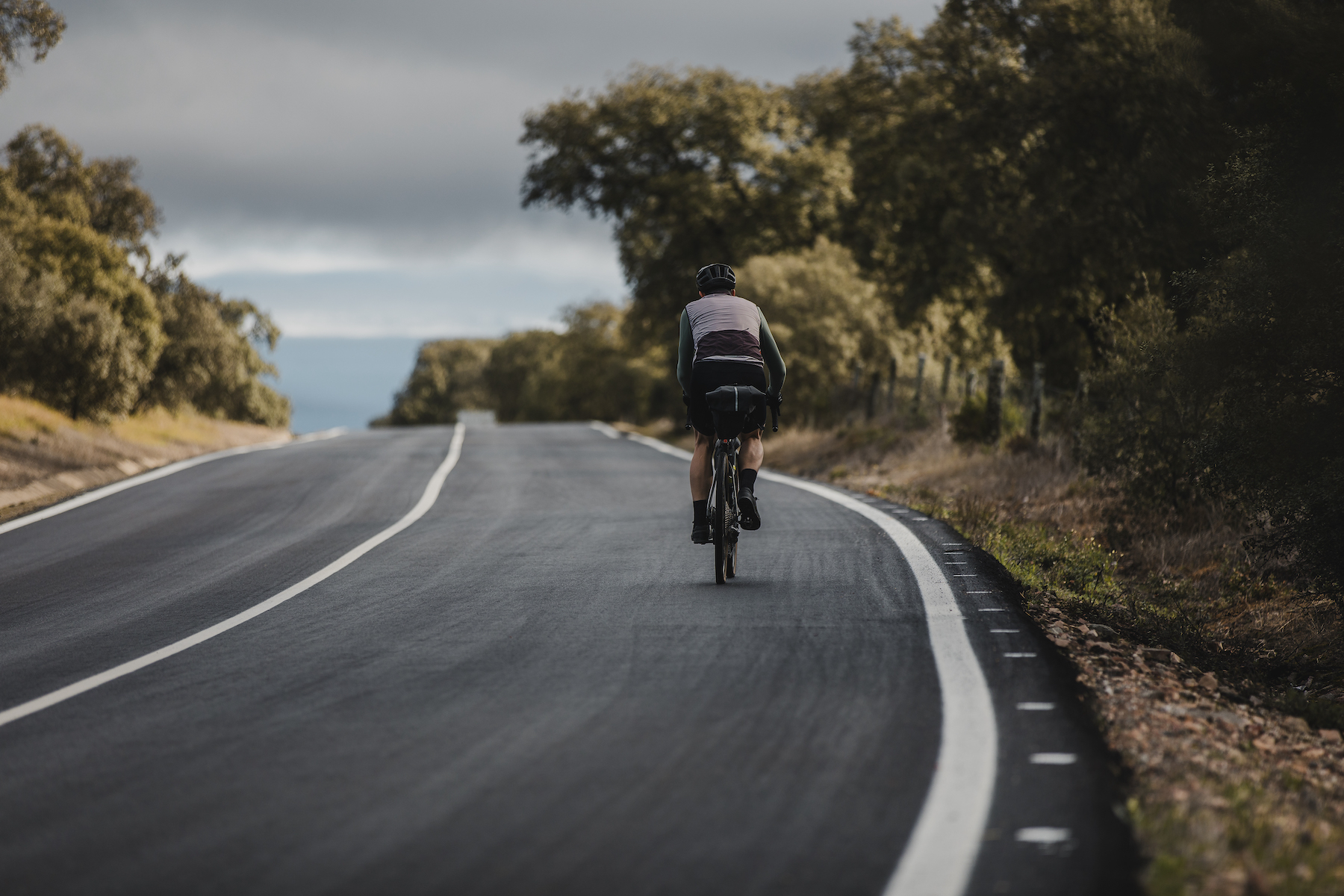 'This is the marriage venue, no?': how one rider ran the whole gamut of hallucinations in a single race
'This is the marriage venue, no?': how one rider ran the whole gamut of hallucinations in a single raceKabir Rachure's first RAAM was a crazy experience in more ways than one, he tells Cycling Weekly's Going Long podcast
By James Shrubsall Published
-
 Full Tour of Britain Women route announced, taking place from North Yorkshire to Glasgow
Full Tour of Britain Women route announced, taking place from North Yorkshire to GlasgowBritish Cycling's Women's WorldTour four-stage race will take place in northern England and Scotland
By Tom Thewlis Published
-
 Positive signs for UK bike industry as Halfords cycling sales grow
Positive signs for UK bike industry as Halfords cycling sales growRetailer admits that the impact of Donald Trump's tariffs remains to be seen
By Tom Thewlis Published